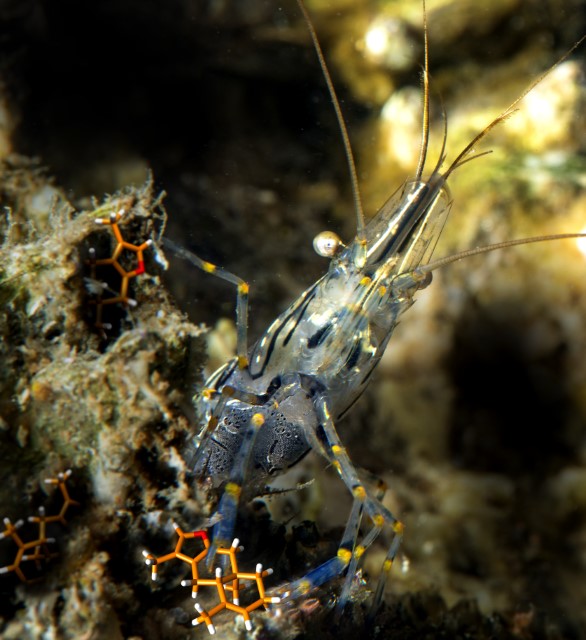 Researchers from Italy and The University of Queensland have discovered that fish and crustaceans such as shrimp can “smell” aromatic compounds in water, after touching them.
Researchers from Italy and The University of Queensland have discovered that fish and crustaceans such as shrimp can “smell” aromatic compounds in water, after touching them.
Co-author Dr Karen Cheney of UQ’s School of Biological Sciences said the new research challenged traditional views about the roles of smell and taste.
“The mouthparts of shrimp and fish included in the study acted as ‘aquatic noses’,” she said.
“This re-defines the way in which we think of smell and touch in aquatic environments.”
The study, led by Dr Ernesto Mollo of the National Research Council of Italy, also involved Professor Mary Garson of UQ’s School of Chemistry and Molecular Biosciences.
“Traditionally, smell is considered a distance sense: when you walk into a room you can smell a bouquet of flowers without touching them, but taste is a contact sense: you taste garlic bread when it comes into contact with your tongue and taste buds,” Dr Cheney said.
“In terrestrial environments, fragrant or scented compounds that cause the smell of the flowers are small molecules that can be transported through the air, whereas, compounds that are tasted (such as the garlic) are soluble in water.”
Dr Cheney said the new paper challenged this traditional view of smell as a distance sense and taste as a contact sense, and that aquatic organisms were restricted to only perceiving waterborne (soluble) compounds.
Professor Garson said that the team isolated aromatic, insoluble compounds from marine organisms (including octocorals and their sea slug predators).
“These same compounds are known to contribute to the smell of turmeric and myrhh in terrestrial plants.
“Such compounds were considered not detectable in aquatic systems because they are insoluble.
“However, aquatic organisms, such as zebra fish and a common crustacean could ‘smell’ these volatile and insoluble compounds, but only after touching them.”
Dr Cheney said the compounds were also aversive to the fish and shrimp that consumed them and in some cases made them sick or vomit.
Food that contained these compounds were subsequently avoided if presented to the same animals again.
This indicated that such compounds helped protect marine organisms from potential predators.
The study, published in PNAS, also included researchers from the National Research Council of Italy, Parthenope University of Naples, Federico II University of Naples, Ganesha University of Education, Indonesia, California Academy of Sciences, and Christian-Albrechts-Universität, Kiel, Germany.
Media: Dr Karen Cheney T 07 336 57386, or 0410 126716, k.cheney@uq.edu.au, or Professor Mary Garson, +61733653605 or +61402715893 m.garson@uq.edu.au



